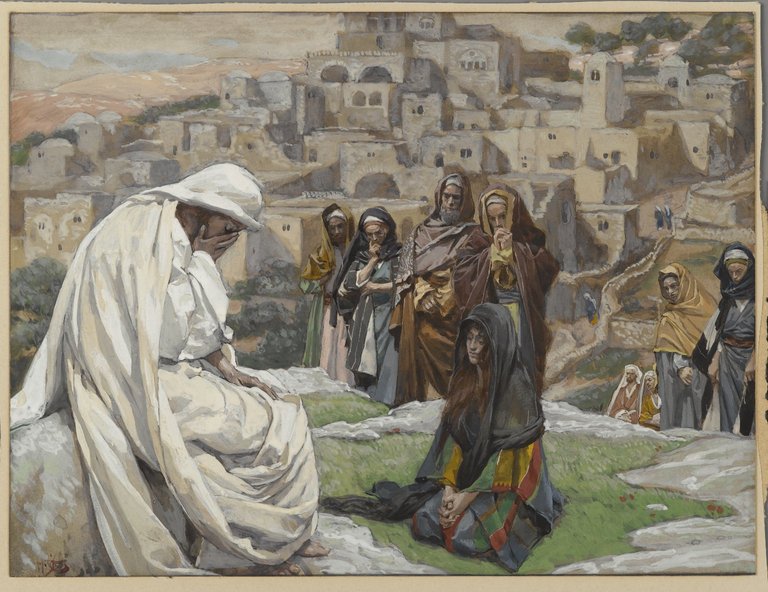Why did Jesus weep? Not cry. Not sniffle. Weep. Hopefully, the question seems odd. His friend died, why wouldn’t he weep, right? But then again, Jesus knew he would raise Lazarus up from the dead. So we ponder, if Jesus knew he was going to raise Lazarus, why did he weep?
This was the question proposed in the sermon this past Sunday, a worthy and accurate account of why Jesus wept. I will link to it when the audio is up. But as this question was posed my mind was wandering. There are many possible answers as to why he wept, but I think an important reason is that Jesus wept because he’s not a pragmatist.
A pragmatist looks at this situation and believes there is nothing to weep over. A pragmatist believes the ends justify the means and so Christ’s weeping before raising Lazarus doesn’t compute. At first glance it doesn’t appear that we view this through pragmatic lenses, but that is because we’re not dealing with a moral issue. It’s easy to spot and criticize pragmatism when evil is used as a path to do good. It’s harder to see it when we’re dealing with the practicality and usefulness of things.
A pragmatist looks at Jesus weeping and sees it as unnecessary. There is no reason why he should be weeping since the very cause of his weeping will be made right by himself in only a few moments. But Jesus, fully knowing that Lazarus will soon rise, still weeps.
The pragmatist simply is unable to come to terms with the fact that Jesus wept simply because he was sad. Twice Jesus was “deeply moved” says John. Jesus doesn’t put the cart before the horse. A man, his friend whom he loved, has died. Lazarus’ sisters, even in their belief in Jesus, are grieving and Jesus resonates with their grief. Something unnatural to the created order has taken place. Death. It’s wrong. And Jesus appropriately responds. Death is heavy, weighty, worth lingering over, even with the knowledge that it will one day be reversed. Jesus lingers over this. Takes the time to weep. The pragmatist is astonished at this. Why waste tears and sobs? Why not snap your fingers and get it over with?
If a pragmatist watching from the sidelines were to ask Jesus about it afterwards, here’s how I think it would’ve gone down:
Pragmatist: If you could raise him from the dead, why did you weep?
Jesus: Because he died and he was my friend and I love him and his sisters.
Pragmatist: No doubt you loved him, but why cry when you knew he’d come alive again?
Jesus: Because he died.
Pragmatist: Of course, but you knew he’d live again.
Jesus: And so will you.
Pragmatist: Sure, sure. Resurrection at the Last Day and stuff. But you knew beforehand that you would raise him from the dead. Your disciples told me that the very reason you came was to “go to awaken him”. You had this planned from before you came. You knew he died when you were far off, and the reason you came was to awaken him. But you still shed tears? Why?
Jesus: Because he died and he was my friend and I love him and his sisters.
If the pragmatist didn’t keep pestering, I’m sure he would’ve thrown up his hands in frustration and walked away.
There is no room for pragmatism in the slightest. Pragmatism demands an answer here that cannot be given because it will always be the wrong answer. Jesus wept because his friend died. Because he saw how much it grieved the sisters. Because death is wrong and weeping in the face of death is right and appropriate. Instead of snapping his fingers and getting the job done Jesus took the time to weep.
Why is it important for us to realize that Jesus’ weeping was a result of him not being a pragmatist? It’s important because there’s a heck-of-a-lot of pragmatists who follow Jesus and for some reason it seems most of them find their way into the ministry. It’s good to notice this because it forces us to realize that pragmatism is antithetic to the way Jesus operated. It’s good for us to see that pragmatism fails even when it’s disconnected from moral issues. A pragmatist sees Jesus’ weeping as unnecessary.
Ministers and pastors and church planters and leadership coaches and whoever else with their fingers in the pie ought to cling to this. Jesus doesn’t operate from a strategic pragmatic position. You’re not going to find a formulaic system you can pull from Scripture to discover the “Jesus Method” and if you do it’s because you’ve already spilled your pragmatic Kool-Aid all over the text. The only way to emulate Jesus is to suffer and die. Deny yourself and take up your cross and all that. That’s the proven track record and, surprise, it’s not pragmatic in the least.
This all sounds good. Pragmatism, boo! Take up your cross, yay! That is, until we get to the church budget, right? It tends to throw a monkey wrench into our leadership goals and ‘vision casting’, doesn’t it? Hopefully it causes us to look at things like grace a bit longer. How many scandals would strike the church if we took grace as seriously as Christ did, and not limit grace to only those who qualify for it under our pragmatic goals? We show love to victims of crime. Do we show love to criminals? Do we love people or do we love a demographic? I could go on. The implications of Jesus weeping are huge.











